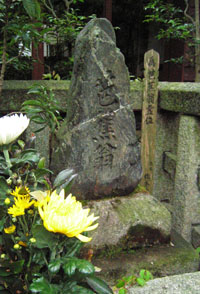BASHO'S FINAL HAIKU Part II
 It was no mystery that Basho, at the end of a life spent wandering in pursuit of plain and humble beauty, chose as his resting place this small, quiet temple that perfectly manifests the principle of sabi, its thatched roof the earth-brown color of Basho's robes. It is also no mystery given the view of the Lake this place afforded during Basho's time; he visited here often for poetry gatherings and no doubt steeped himself in its history.
It was no mystery that Basho, at the end of a life spent wandering in pursuit of plain and humble beauty, chose as his resting place this small, quiet temple that perfectly manifests the principle of sabi, its thatched roof the earth-brown color of Basho's robes. It is also no mystery given the view of the Lake this place afforded during Basho's time; he visited here often for poetry gatherings and no doubt steeped himself in its history.The mystery for me was why Basho, after an entire life spent in pursuit of the ephemera of words, as a lover of beauty, as a recluse who lived much of his life in simple austere refinement, as one who named himself after a useless banana plant (growing in a clime too cold for it to bear fruit) and having visited the many beautiful places in Japan on his far wanderings, should in his will reveal the wish to have his grave placed beside that of Kiso Yoshinaka, a renowned, ambitious, vengeful warrior who had been slain by his Minamoto cousins on the spot where this temple, Gichuin (Gichu is another pronunciation of Kiso's name) was built to commemorate him, warrior star of the Heike Monogatari, centuries before Basho was born.
Basho himself was born to a lowly samurai family of Ueno and was reputedly a ninja (Iga-ueno was (and still is) the ninja ‘capital’ of Japan), but not much credence is placed in this theory, which might link Basho-as-samurai to Kiso-as-samurai. I think it's more likely, given Basho's skills, that in choosing this place he did the same thing he did in his poetry: he combined very disparate elements to great dissonantive effect. Much more evocative than a monotone grave in a forest somewhere.
 So there they lie, side by side: the tragic, vainglorious, multiply betrayed warrior and the simple, reclusive wandering poet, in precincts dotted with many haiku-carved stones - placed there by Basho's students and admirers over the centuries - and the grave stone of Kiso's Kyoto mistress over there in the corner (she killed herself upon hearing Kiso had been slain; Kiso's wife was forced to marry into the victorious side of the Minamoto clan, later became a mendicant nun and returned to Nagano in her final days...
So there they lie, side by side: the tragic, vainglorious, multiply betrayed warrior and the simple, reclusive wandering poet, in precincts dotted with many haiku-carved stones - placed there by Basho's students and admirers over the centuries - and the grave stone of Kiso's Kyoto mistress over there in the corner (she killed herself upon hearing Kiso had been slain; Kiso's wife was forced to marry into the victorious side of the Minamoto clan, later became a mendicant nun and returned to Nagano in her final days...By choosing to reside in these simple grounds, Basho has created his final, unspoken and unending poem, evoked in the spirit of all who come to visit here and let the long silence tell the stories that lie quietly in this place...
***
Here's an English translation of Basho's "The Narrow Road to the Deep North" (Oku no Hosomichi).


















No comments:
Post a Comment